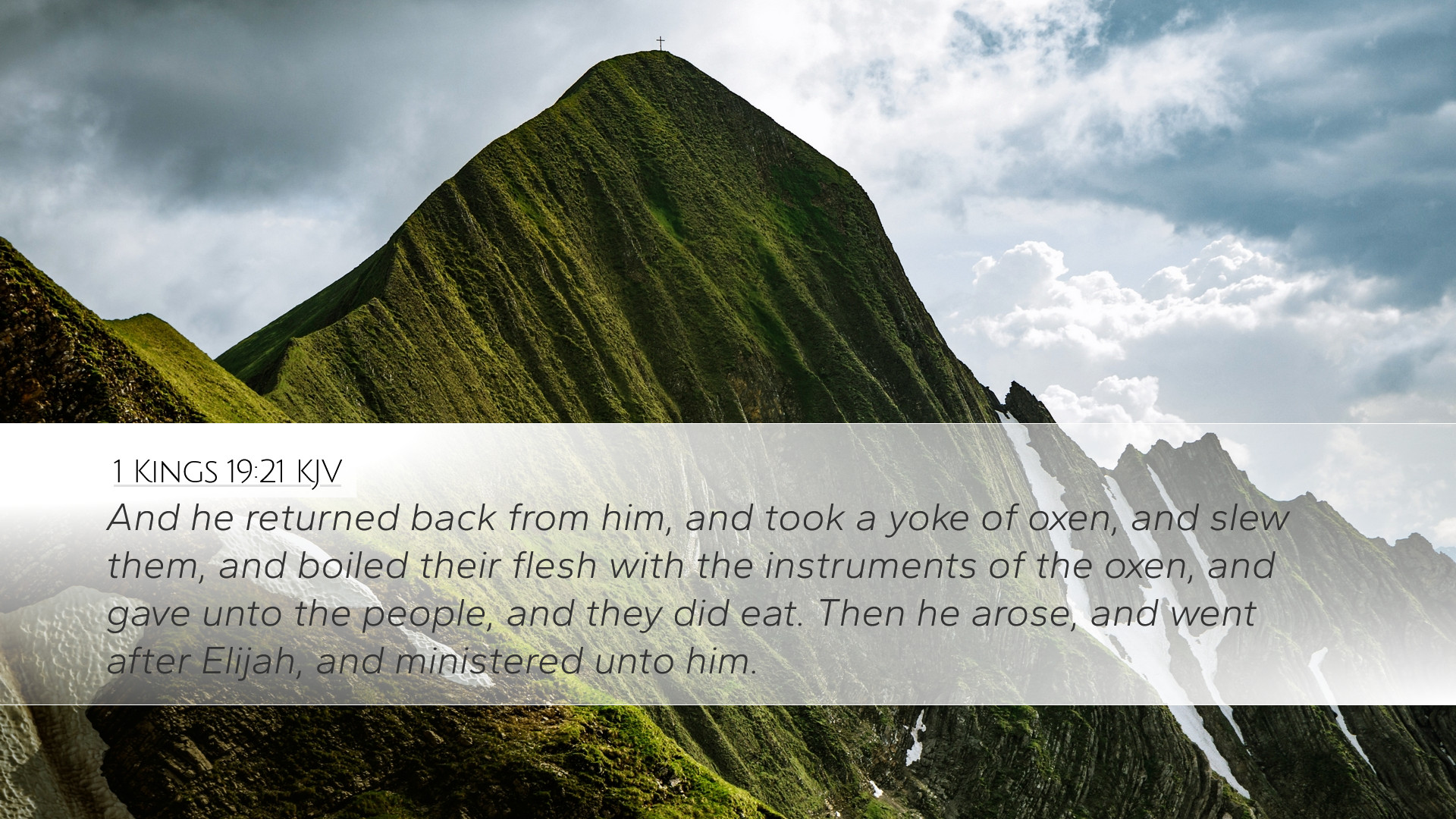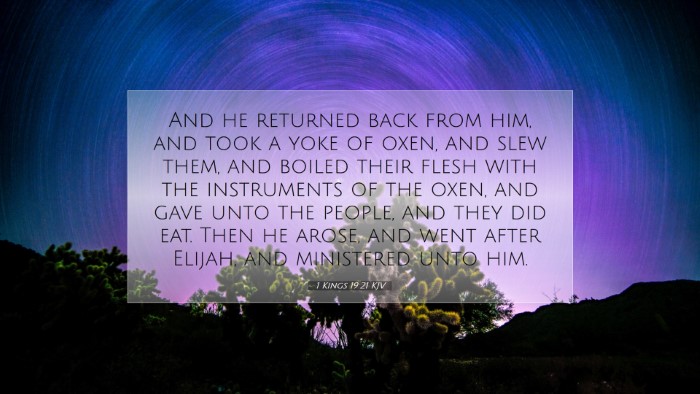Old Testament
Genesis Exodus Leviticus Numbers Deuteronomy Joshua Judges Ruth 1 Samuel 2 Samuel 1 Kings 2 Kings 1 Chronicles 2 Chronicles Ezra Nehemiah Esther Job Psalms Proverbs Ecclesiastes Song of Solomon Isaiah Jeremiah Lamentations Ezekiel Daniel Hosea Joel Amos Obadiah Jonah Micah Nahum Habakkuk Zephaniah Haggai Zechariah Malachi1 Kings 19:21
1 Kings 19:21 KJV
And he returned back from him, and took a yoke of oxen, and slew them, and boiled their flesh with the instruments of the oxen, and gave unto the people, and they did eat. Then he arose, and went after Elijah, and ministered unto him.
1 Kings 19:21 Bible Commentary
Commentary on 1 Kings 19:21
Verse Text: "So Elijah went from there and found Elisha son of Shaphat. He was plowing with twelve yoke of oxen, and he himself was driving the twelfth pair. Elijah went up to him and threw his cloak around him."
Introduction
This verse marks a significant transition in the prophetic ministry of Israel, where Elijah, the great prophet, anoints Elisha as his successor. The act of throwing the cloak signifies both calling and commissioning. This commentary seeks to provide insights into the profound implications of this passage taken from various public domain sources.
Historical Context
The backdrop of this narrative is critical. Elijah, having just fled from Queen Jezebel's threats after his victory over the prophets of Baal, finds himself in a moment of divine instruction. God re-establishes His agenda through Elijah by appointing Elisha, indicating God's sustained commitment to His people despite the prevailing apostasy.
Commentary Insights
-
Matthew Henry’s Commentary:
Henry emphasizes the intimate details of Elisha’s calling. The fact that Elisha was plowing with twelve yoke of oxen suggests wealth and responsibility. Elijah’s choice of a successor demonstrates God’s selection of those who are faithful in their daily tasks. God often uses individuals engaged in humble labor for His great purposes.
-
Albert Barnes' Notes:
Barnes notes that the act of throwing the cloak signifies the transfer of prophetic office. It was customary for prophets to wear distinctive garments, and thus, this outward sign represented Elisha’s new role. The twelve yoke of oxen also indicate that Elisha was not only a laborer but part of a substantial farming operation, reflecting a potential challenge of leaving behind a prosperous life for prophetic service.
-
Adam Clarke's Commentary:
Clarke elaborates on the symbolism found in the cloak. By donning Elijah’s cloak, Elisha was not merely receiving a material object but was also taking on a significant spiritual mantle. Clarke highlights the immediate and unquestioning response of Elisha, which speaks to his readiness for the call of God. Elisha’s act of burning his plough symbolizes total commitment, indicating that he would not look back.
Theological Implications
This narrative presents profound theological truths regarding divine calling and the nature of discipleship.
-
Divine Selection:
The choice of Elisha demonstrates that God’s ways are not aligned with human reasoning. He selects ordinary individuals for extraordinary purposes. Each person’s daily life and duties hold potential for divine calling.
-
Transformation and Commitment:
Elisha’s response exemplifies true discipleship. The act of burning his plough signifies a break from his past life, reflecting a total commitment to God’s mission. This passage challenges readers to consider their own calling and the readiness to forsake their familiar comforts for God's work.
-
Symbolism of the Cloak:
The cloak serves as a metaphor for the anointing and empowerment by God’s Spirit. It calls to mind the weight of responsibility that comes with prophetic ministry, urging a serious reflection on what it means to carry God's message in a world often opposed to His truth.
Application for Today’s Believers
As contemporary believers and leaders, several applications arise from this passage:
-
Responding to God’s Call:
Like Elisha, believers must be attentive to the Holy Spirit’s prompting and be willing to sacrifice their personal aspirations for God's greater purpose.
-
Mentorship and Succession:
This narrative points to the importance of mentorship within the church. Pastors and leaders should seek to engage, equip, and empower the next generation of leaders to carry on the work of God.
-
Faithfulness in Daily Work:
Elisha was found faithful in a menial task, offering a reminder that all work done unto God is significant. Believers are encouraged to view their daily responsibilities as opportunities for divine encounters.
Conclusion
1 Kings 19:21 captures a pivotal moment in biblical history, rich with lessons on calling, commitment, and transition. The unified perspectives from public domain commentaries remind us that God continues to work through ordinary individuals, transforming them for extraordinary purposes. As such, this passage serves as a clarion call to respond faithfully to God’s voice and take up the mantle He has prepared for each one of us.


